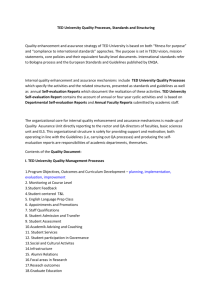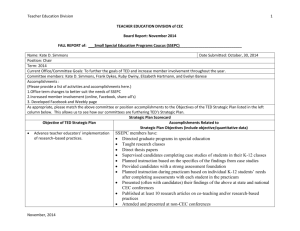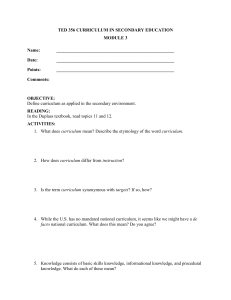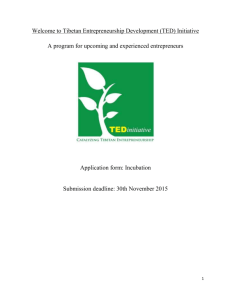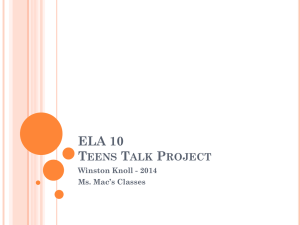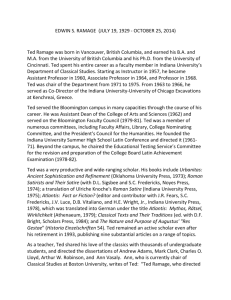TED 356 syllabus - Misericordia University
advertisement
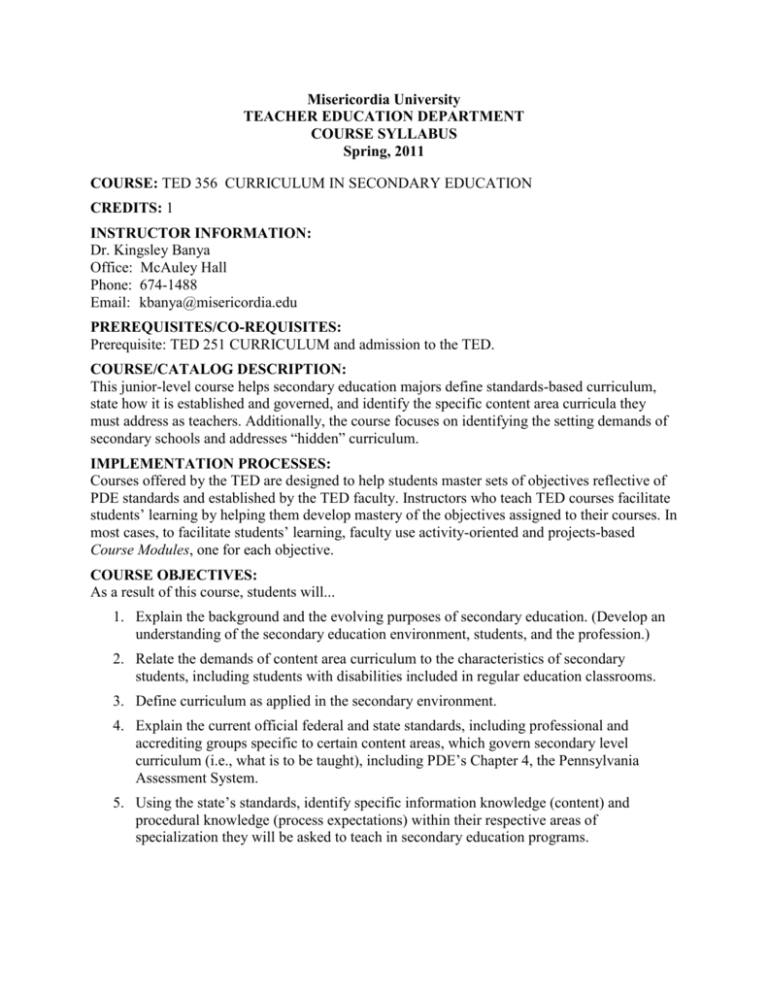
Misericordia University TEACHER EDUCATION DEPARTMENT COURSE SYLLABUS Spring, 2011 COURSE: TED 356 CURRICULUM IN SECONDARY EDUCATION CREDITS: 1 INSTRUCTOR INFORMATION: Dr. Kingsley Banya Office: McAuley Hall Phone: 674-1488 Email: kbanya@misericordia.edu PREREQUISITES/CO-REQUISITES: Prerequisite: TED 251 CURRICULUM and admission to the TED. COURSE/CATALOG DESCRIPTION: This junior-level course helps secondary education majors define standards-based curriculum, state how it is established and governed, and identify the specific content area curricula they must address as teachers. Additionally, the course focuses on identifying the setting demands of secondary schools and addresses “hidden” curriculum. IMPLEMENTATION PROCESSES: Courses offered by the TED are designed to help students master sets of objectives reflective of PDE standards and established by the TED faculty. Instructors who teach TED courses facilitate students’ learning by helping them develop mastery of the objectives assigned to their courses. In most cases, to facilitate students’ learning, faculty use activity-oriented and projects-based Course Modules, one for each objective. COURSE OBJECTIVES: As a result of this course, students will... 1. Explain the background and the evolving purposes of secondary education. (Develop an understanding of the secondary education environment, students, and the profession.) 2. Relate the demands of content area curriculum to the characteristics of secondary students, including students with disabilities included in regular education classrooms. 3. Define curriculum as applied in the secondary environment. 4. Explain the current official federal and state standards, including professional and accrediting groups specific to certain content areas, which govern secondary level curriculum (i.e., what is to be taught), including PDE’s Chapter 4, the Pennsylvania Assessment System. 5. Using the state’s standards, identify specific information knowledge (content) and procedural knowledge (process expectations) within their respective areas of specialization they will be asked to teach in secondary education programs. 6. Explain how teachers use standards-based curriculum to develop courses, supported by professional development resources (including technological resources) recommended or described by professional organizations. 7. Explain how curriculum from various content areas can be integrated for use in secondary education. EVALUATION PLANS: Modules (25%): Mastery of each of the objectives assigned to this course will be developed via a series of activities listed in the modules. Students are expected to submit modules by the due date established by the instructor. Independent Projects (25%): Students are expected to complete an independent project associated with each of the modules. The independent projects serve to reinforce the course objectives. Students are expected to submit modules by the due date established by the instructor. Class Activities (25%): Students are expected to complete class activities associated with each of the modules. The class activities serve to reinforce the course objectives. Student groups are expected to submit modules by the due date established by the instructor. Students who have unexcused absences will not be permitted to make up any of these activities. Due to the in-class nature of many of these activities, students must be present to participate in the activities. Even students with excused absences may not be able to complete the activities. Final Examination (25%): Students who have demonstrated mastery by successfully completing the modules and independent projects will earn the opportunity to sit for a PRAXIS II-like, scenario-based Final Examination that will be administered during the last class meeting. GRADING SYSTEM: The grading system is based on the mastery learning paradigm (see TED Guidebook). Students may earn up 25 points (25%) for each of the following categories of activities: modules, independent projects, class activities, final examination. Students should assemble a Course Portfolio, containing all of the materials from this course. Students should maintain their Course Portfolios for use in subsequent courses (e..g., Methods in Secondary Education) and even until graduation; elements may be used to assemble a Senior Presentation Portfolio, to study for PRAXIS II, and for other purposes. MATERIALS REQUIRED: Required textbook: Middle and High School Teaching: Methods, Standards, and Best Practices by James A. Duplass, Houghton Mifflin, 2006. ISBN 0-618-43575-1 Students should download copies of the Chapter 5 standards for their respective areas of specialization and the standards suggested by their professional organizations. They should have both in all classes meetings. Students may wish to purchase test preparation booklets, either generic or state-specific, per their respective areas of certification to assist in preparing to take and pass the PRAXIS II NTE exams. All course materials and announcements are available on the course Web site, available at www.misericordia.edu/academics/education/drsteve POLICIES: Academic Integrity The policy stated in the TED Guidebook will obtain in this course. Forms of cheating may be seen as violations of the TED’s Code of Ethics and will be addressed accordingly (see TED Code of Ethics in the TED Guidebook). For example, students are supposed to independently complete all projects and the Course Project. Students who do not do so might violate the policy. Attendance and Participation The policy stated in the TED Guidebook will obtain in this course. Basically, students must attend and be prepared to actively participate in every class meeting. Failure to do so may be seen by the instructor as violations of the TED’s Integrity Policy. To be excused from class, students must report off by calling Mrs. Rose Hometchko (570-674-6270) and by contacting the instructor (either by phone or by e-mail). Students with Disabilities All students are expected to enter this course with the essential competencies (see Essential Performance Demands) that enable them to successfully master the requirements stated in this syllabus. Reasonable accommodations may be arranged through the college’s Alternative Learners Project. Cell Phone Policy It is permissible to keep your cell phone on in class, provided that you place it in the vibrate mode, so that you can receive emergency transmissions from the Wireless Emergency Notification System. Sign up to receive these alerts on e-MU.

